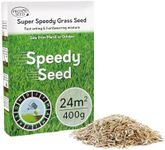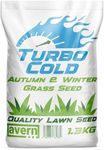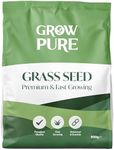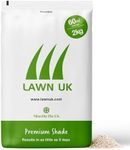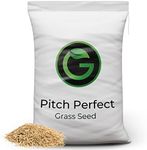Buying Guide for the Best Lawn Grass Seeds
Choosing the right lawn grass seeds is essential for creating a beautiful and healthy lawn. The type of grass seed you select will depend on various factors such as your climate, soil type, and the amount of sunlight your lawn receives. Understanding the key specifications of grass seeds will help you make an informed decision and ensure that your lawn thrives.Grass TypeGrass type refers to the species of grass that the seeds will grow into. This is important because different grass types have varying tolerances to climate, soil, and sunlight. Cool-season grasses, such as Kentucky bluegrass and fescue, thrive in cooler climates and are best for northern regions. Warm-season grasses, like Bermuda and Zoysia, are better suited for warmer climates and southern regions. Choose a grass type that matches your local climate and growing conditions.
Sunlight RequirementsSunlight requirements indicate how much sunlight the grass needs to grow well. This is crucial because planting a grass type that doesn't match your lawn's sunlight exposure can lead to poor growth. Full sun grasses need at least 6-8 hours of direct sunlight per day, while shade-tolerant grasses can grow with less sunlight, around 3-4 hours. Assess the amount of sunlight your lawn receives and select a grass seed that matches those conditions.
Soil Type CompatibilitySoil type compatibility refers to how well the grass seed will grow in your soil. Different grasses have different soil preferences, such as sandy, loamy, or clay soils. It's important to know your soil type and choose a grass seed that is compatible with it. For example, fescue grasses do well in clay soils, while Bermuda grass prefers sandy soils. Conduct a soil test to determine your soil type and select a grass seed that will thrive in those conditions.
Drought ToleranceDrought tolerance indicates how well the grass can withstand periods of low water availability. This is important if you live in an area with water restrictions or frequent dry spells. High drought tolerance grasses, like Bermuda and Buffalo grass, can survive with minimal watering, while low drought tolerance grasses, such as Kentucky bluegrass, require more frequent watering. Consider your local water availability and choose a grass seed with the appropriate drought tolerance.
Traffic ToleranceTraffic tolerance refers to the grass's ability to withstand foot traffic and other physical activities. This is important if your lawn will be used frequently for activities like playing, walking, or entertaining. High traffic tolerance grasses, such as Bermuda and Zoysia, are more durable and can recover quickly from damage. If your lawn will see a lot of use, choose a grass seed with high traffic tolerance to ensure it remains healthy and attractive.
Maintenance RequirementsMaintenance requirements indicate how much care and effort the grass will need to stay healthy. This includes mowing, fertilizing, watering, and pest control. Low maintenance grasses, like fescue and Buffalo grass, require less frequent care, while high maintenance grasses, such as Kentucky bluegrass, need more regular attention. Consider how much time and effort you are willing to invest in lawn care and choose a grass seed with maintenance requirements that match your lifestyle.
